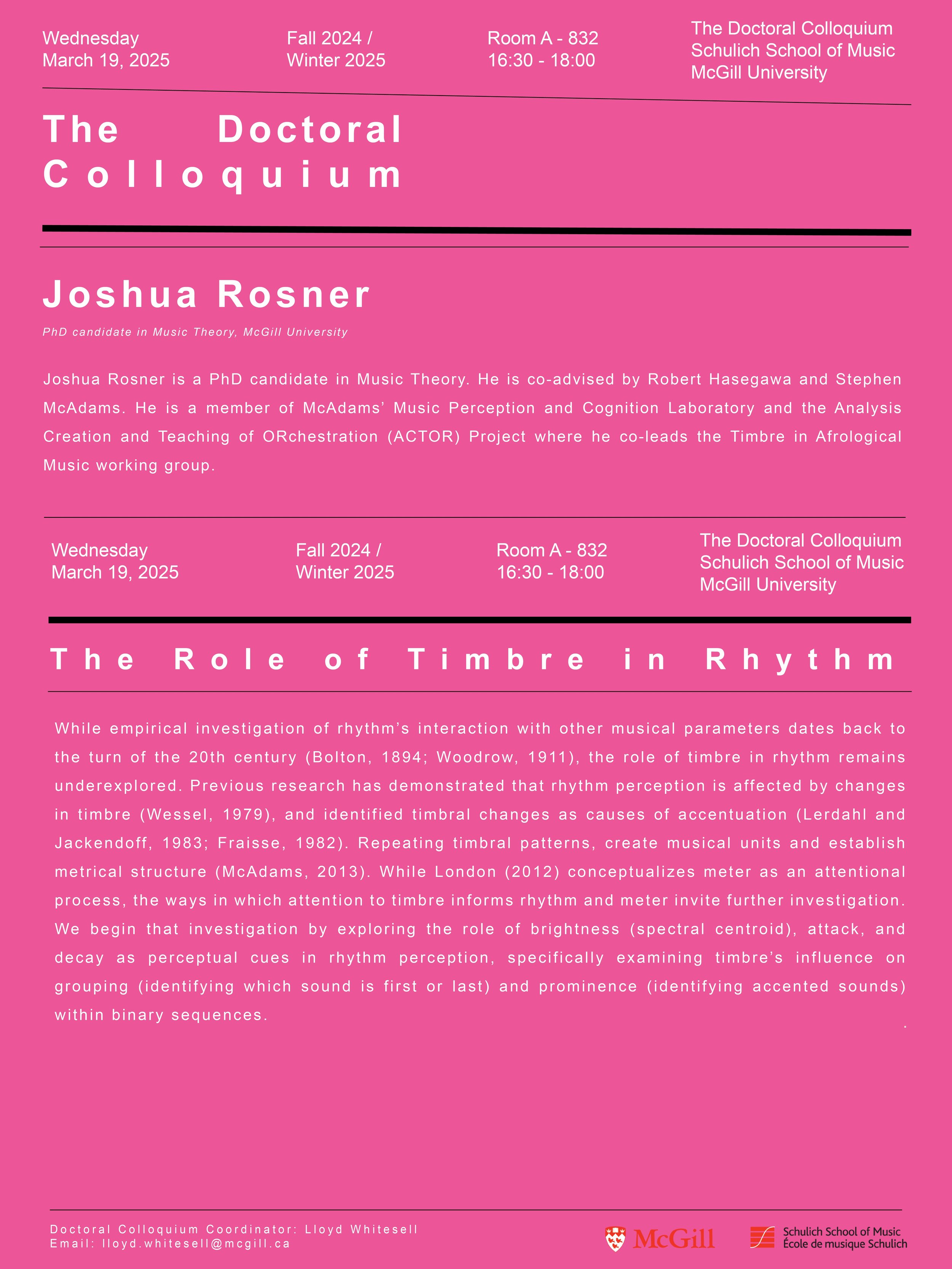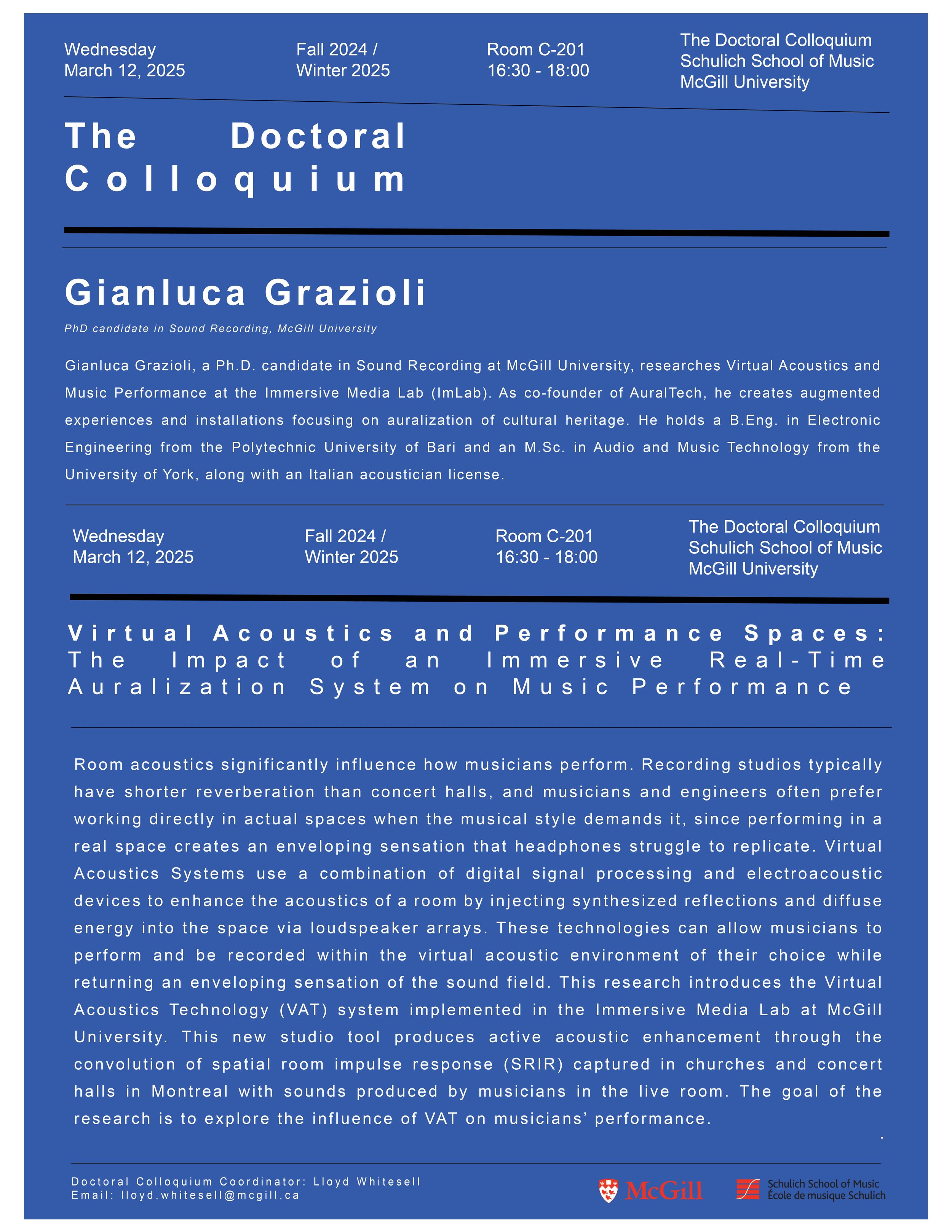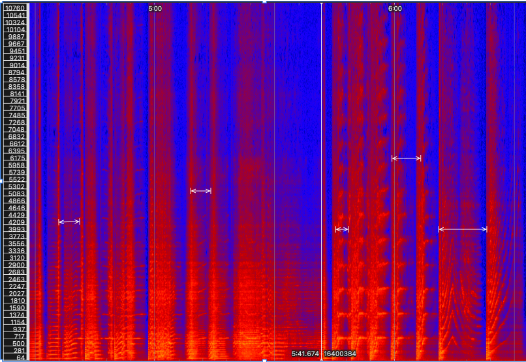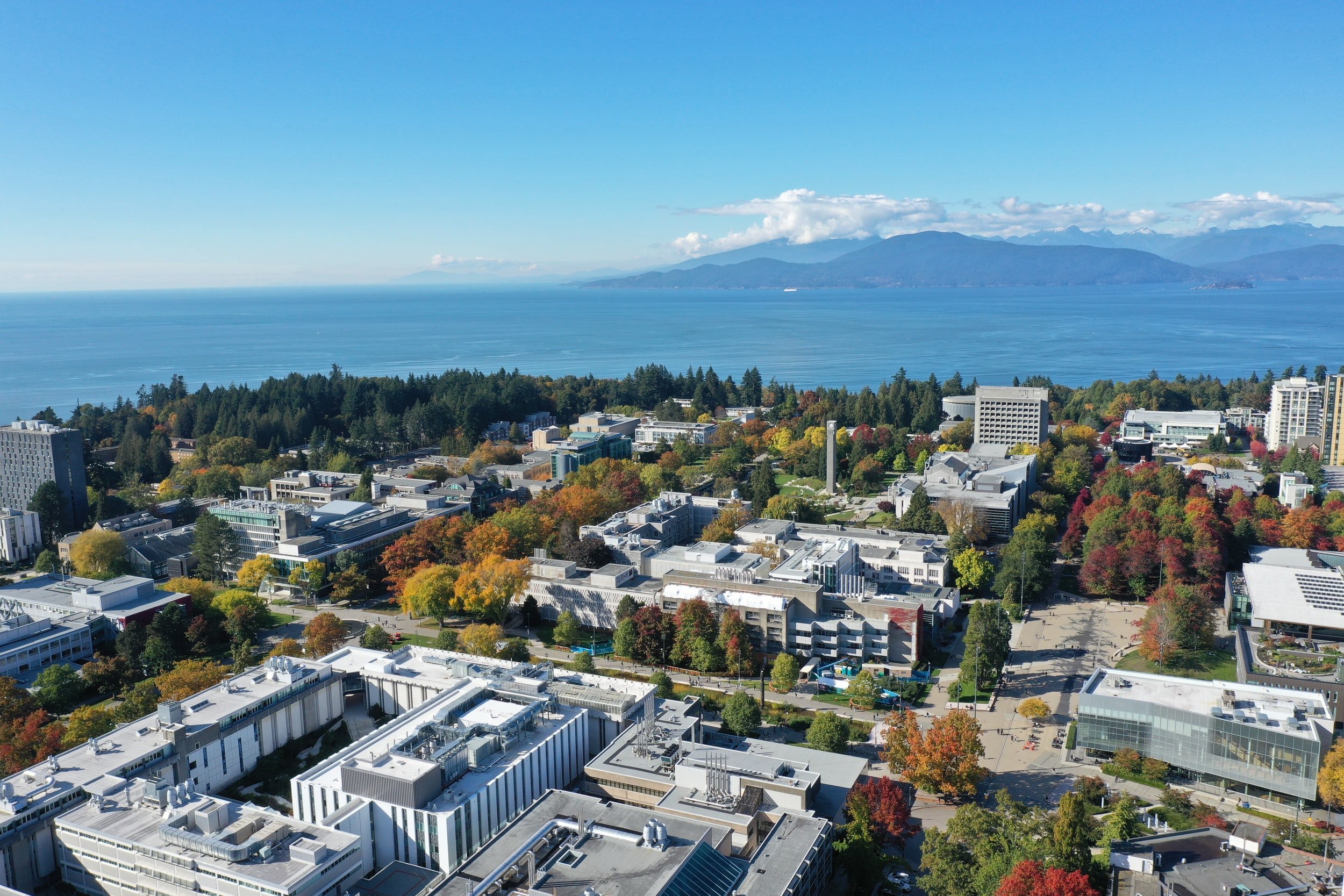
CORE Round 3 Concert – McGill University
The third round of the CORE project at McGill in 2024-25 included the original quartet plus electronics. The final concert/presentation will take place in the Schulich School of Music's Music Multimedia Room at 527 Sherbrooke Street West at 4:00pm on Thursday, April 10, 2025.

Book Launch
The Marvin Duchow Music Library and Prof. Stephen McAdams invite you to a book launch celebrating his new publication, Perception and Cognition of Music: The Sorbonne Lectures (Oxford University Press, 2024).
The event will be held in the Music Library on Friday, April 11, 2025, from 6pm to 8pm. Registration/RSVP

Timbre and Orchestration Summer School
The Analysis, Creation, and Teaching of Orchestration (ACTOR) project is pleased to announce that third edition of the Timbre & Orchestration Summer School will be held at McGill University, Montreal, Canada, June 03-07, 2025

ACTOR Y7 Workshop 2025 — Geneva, Switzerland
It is official! We are pleased to confirm that the Y7 workshop will take place at the Haute école de musique in Geneva, Switzerland, 7-9 July 2025.

CORE Round 3 Concert – Université de Montréal
Composing, performing and analyzing contemporary orchestration” seminar concert
This concert will present works created by graduate students in composition, performance and musicology, as part of the interdisciplinary seminar “Composing, performing and analyzing contemporary orchestration” given by Jimmie LeBlanc, Kit Soden and Caroline Traube at the Université de Montréal's Faculty of Music.

McGill Doctoral Colloquium
Colloquium on March 26.
Ying-Ying Zhang (PhD candidate, Sound Recording)

Arts, Humanities and Interdisciplinary Methodologies Workgroup
The Arts and Humanities Interdisciplinary Methodologies Workgroup will meet on Monday, March 24, at 10 a.m. Eastern time (11 a.m. Atlantic; 3 p.m. CET).
All ACTORians are welcome to attend and participate. We will discuss issues that arise in developing interdisciplinary projects, particularly the benefits and pitfalls of methodological appropriation.

McGill Doctoral Colloquium
Colloquium on March 19.
Joshua Rosner (PhD candidate, Theory)

Timbre Semantics Workgroup
The Timbre Semantics Workgroup will meet four times over the course of this semester. All are invited to attend any or all of the meetings, whether or not you have been in previous semantics meetings.

McGill Doctoral Colloquium
Colloquium on March 12.
Gianluca Grazioli (PhD candidate, Sound Recording), “Virtual Acoustics and Performance Spaces: The Impact of an Immersive Real-Time Auralization System on Music Performance”


Timbre Semantics Workgroup
The Timbre Semantics Workgroup will meet four times over the course of this semester. All are invited to attend any or all of the meetings, whether or not you have been in previous semantics meetings.

McGill Doctoral Colloquium
Colloquium on January 29.
Benjamin Lavastre, “Interactions Strategies in Mixed Compositions Between Acoustic Instruments and Digital Musical Instruments: Case Study with the Karlax.”

Timbre Geeks Networking (TGN) 2025
ACTOR's Training and Mentoring Committee is pleased to announce our annual Timbre Geeks Networking (TGN) event, which will be held online on January 17, 12:00-2:00.

Timbre Semantics Workgroup
The Timbre Semantics Workgroup will meet four times over the course of this semester. All are invited to attend any or all of the meetings, whether or not you have been in previous semantics meetings.

Orchestration Pedagogy Workshop
The ACTOR Project Training and Mentoring Committee is organizing the first Workshop on Orchestration Pedagogy. The event will focus on various approaches to teaching orchestration through demonstrations, discussions, and the examination of orchestration syllabi.

McGill Doctoral Colloquium
Colloquium on November 27.
Viktor Lazarov, “Creating and Analysing Baroque Performance Practice on the Piano,” Lecture-recital
Valérian Fraisse FROM SOUND ART TO SOUNDSCAPE: A research-creation approach for designing and evaluating public space sound installations

Timbre Semantics Workgroup
The Timbre Semantics Workgroup will meet four times over the course of this semester. All are invited to attend any or all of the meetings, whether or not you have been in previous semantics meetings.

McGill Doctoral Colloquium
Colloquium on November 20.
Louis-Michel Tougas (Composition), “Issues and Cognitive Limits of Polyrhythm: A Multidisciplinary Approach”
Theodora Nestorova (Applied Performance Science), “Vocal Vibrato Variability: Novel Analytical Tools & Diagnostic-Pedagogical Approaches in Diverse Genres”

Cimbalom on the Stage
The intention of the workshop named "Cimbalom on the Stage" is to introduce the cimbalom as a fully fledged concert instrument whose specific sounds and far-reaching possibilities are increasingly coming to be appreciated in the world of both traditional and contemporary music. Daniel Skála, one of the most striking cimbalom players in the world today, along with leading player of the young generation Matěj Číp, will introduce the cimbalom in its paramount performance form.

Workshop on voice, timbre, metaphors and materiality in contemporary music
Following Nina Eidsheim’s Distinguished Lecture "Metaphor as material practice" on November 11, 2024, this joint CIRMMT/ACTOR workshop will focus on vocal and instrumental timbre in relation to the metaphors used to describe them and to the concept of materiality in contemporary music.

McGill Doctoral Colloquium
Colloquium on November 20.
Jade Roth, “Orchestration Semantics: How Tailleferre’s Orchestration Conjures Imagery in the Ballade (1920)”

Functional orchestration: principles, recent findings, prospects
Functional orchestration is an approach to orchestration (orchestration practice as well as music theory and orchestration analysis) that attempts to link orchestration techniques with perceptual effects by considering their musical and perceptual goals (functions).

Timbre Semantics Workgroup
The Timbre Semantics Workgroup will meet four times over the course of this semester. All are invited to attend any or all of the meetings, whether or not you have been in previous semantics meetings.

Arts, Humanities, and Interdisciplinary Methodologies Workgroup
The Arts, Humanities, and Interdisciplinary Methodologies workgroup will hold its first meeting on Wednesday, September 25th at 10:00 AM EST.
We will reserve time to discuss projects at any stage, from conception to completion.
All are welcome!

Timbre Semantics Workgroup
The Timbre Semantics Workgroup will meet four times over the course of this semester. All are invited to attend any or all of the meetings, whether or not you have been in previous semantics meetings. If you’d like more detail about what the topics below are, I recommend looking at the Y6 meeting documentation, and you’re also welcome to message/email Jason and I with questions.
All meetings are on Mondays at 1pm Eastern for this semester, based on the results of the general availability poll. We will take notes and record at all meetings. If there’s one you’d like to be at but can’t attend, let us know, and we’ll keep you updated/in the loop.
All meetings will be hosted on Zoom.
September 16, 1pm Eastern - Semantics Pedagogy Project
October 21, 1pm Eastern - Cross-linguistic Semantics Project
November 25, 1pm Eastern - Data Organization and Tool Development
December 9, 1pm Eastern - General meeting; updates & discussion
Best,
Lindsey Reymore (LREYMORE[at]asu.edu) and Jason Noble (jason.noble[at]umoncton.ca)

Elegies
Kjel Sidolski, organist and master student in composition at University of Montréal, will perform his piece Élégies at Église Saint-Édouard in Montréal (6500, rue de Saint-Vallier), in the context of the Religious Heritage Days.

ACTOR Y6 Workshop 2024 — Vancouver
The Year 6 Annual Workshop will be hosted by the School of Music of the University of British Columbia, in Vancouver, BC, Canada. It will be held in a hybrid format (online/in person). This year, the workshop will be preceded by a three-day edition of the second Timbre and Orchestration Summer School (TOSS).
The event page can be found here.

Timbre and Orchestration Summer School | Vancouver
The Analysis, Creation, and Teaching of Orchestration (ACTOR) Project is pleased to announce our second Timbre and Orchestration Summer School (TOSS2), held at the University of British Columbia’s School of Music in Vancouver, Canada, July 12–15, 2024.

Timbre Semantics Workgroup Meeting
Hello all!
The Timbre Semantics Workgroup will be holding a Zoom meeting on Thursday, June 13 at 12:30pm Eastern time. You will be able to join the meeting here: https://asu.zoom.us/j/5352528724
All are welcome, whether or not you have been to a previous semantics workgroup meeting.
If you would like to share a project update, brainstorm an idea, or put a call out for collaborators (this can be as formal or as informal as you'd like), email Lindsey Reymore at lreymore@asu.edu. We’ll also be sharing informal updates and discussing future projects for the workgroup.
Hope to see you there!
Concert “Vacillations harmoniques en six tableaux”
Hello everyone,
There will an upcoming concert co-organised by the QUASAR saxophone quartet and ACTOR called "Vacillations harmoniques en six tableaux", featuring premieres by 6 McGill composers (2 from our lab). The concert will take place in the MMR (Elizabeth Wirth Building, -2) on Thursday May 9 at 7:30pm. After several months of research, meetings and creative workshops, the QUASAR musicians and composers are ready to present the fruit of this new collaboration.
PROGRAMME (free admission)
Andrés Gutiérrez Martínez - Ebb and Flow (Premiere, 2024)
Chelsea Komschlies - Beneath the Old Power Plant (Premiere, 2024)
Anita Pari - A Flickering Glow (Premiere, 2024)
Lila Wildy Quillin - Amortisseur Harmonique (Premiere, 2024)
Jonas Regnier - En s'effaçant (Premiere, 2024)
Louis-Michel Tougas - Cinq miniatures (Premiere, 2024)
https://www.facebook.com/events/1461265471172078?acontext=%7B%22event_action_history%22%3A[]%7D
Looking forward to seeing you there!

Timbre Semantics Workgroup Meeting
Timbre Semantics Workgroup Meeting
Hello all!
The Timbre Semantics Workgroup will be holding a Zoom meeting on Thursday, May 9 at 11:00am Eastern time. You will be able to join the meeting here: https://asu.zoom.us/j/5352528724
All are welcome, whether or not you have been to a previous semantics workgroup meeting.
If you would like to share a project update, brainstorm an idea, or put a call out for collaborators (this can be as formal or as informal as you'd like), email Lindsey Reymore at lreymore@asu.edu. We’ll also be sharing informal updates and discussing future projects for the workgroup.
Hope to see you there!

Timbre and Orchestration Analysis Workgroup Meeting
The Timbre and Orchestration Analysis Workgroup will be meeting via Zoom from 10:00 to 11:30 (EDT) on April 5. All ACTOR members with an interest in music analysis are welcome to attend. The agenda for this meeting will include planning for our session at the Y6 workshop in Vancouver and lightning talks on ongoing analysis-related projects by ACTOR members—anyone who'd like to present should contact Robert Hasegawa (robert.hasegawa@mcgill.ca).
Zoom Link https://mcgill.zoom.us/j/2632309272.

CIRMMT-ACTOR Symposium on Orchestration Research VIII
ACTOR is pleased to announce the seventh ACTOR / CIRMMT Student Symposium, held as a online event on Friday, March 22nd, 12pm-2pm.
